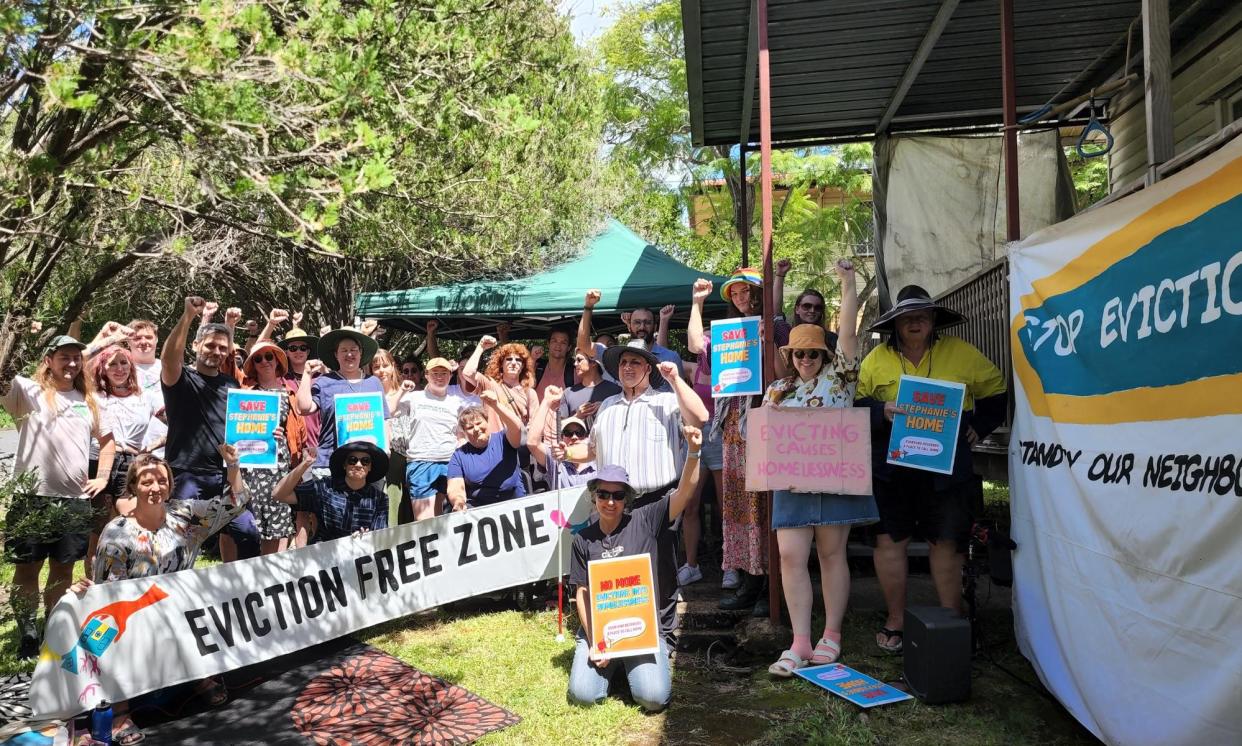‘Nowhere else to go’: protesters rally in support of Brisbane woman refusing to leave rental home of 22 years

Stephanie Cridland has lived in the same Brisbane rental property for more than 20 years.
The 51-year-old lives with her dog and pet fish in an old Queenslander
but after receiving notice to leave last year, she is concerned she’ll end up on the street.
Cridland’s dilemma prompted Greens candidate for Brisbane mayor, Jonathan Sriranganathan, on Tuesday to organise a snap anti-eviction protest outside Cridland’s rental. It’s one of several protests organised by the party in recent years in the wake of a rental crisis. Women aged 55 and over are especially vulnerable, with the number finding themselves homeless up almost 40% between 2011 and 2021, according to ABS data.
Cridland, who has been paying $290 a week rent, has been looking for alternative accommodation since Christmas but can’t afford the higher rents.
She has lodged a case with the Queensland Civil and Administrative Tribunal. “I’ve got nowhere else to go,” she said. “If I end up homeless, how do I look after a fish in a car?”
Her sister, Imogen Bunting, is concerned Cridland will be forced to leave before she finds stable accommodation.
“We’d like to see an end to no-fault evictions and to make sure that particularly older women, who are the largest growing cohort of homeless [people], aren’t evicted, ” she said.
Cridland’s story is not unusual. In 2022 Guardian Australia reported on Bernie Maloney, a pensioner who inspired a civil disobedience campaign to stop forced evictions after he was asked to leave the Milton home he had been renting for a decade.
The Greens want rent caps, and a ban on no-grounds evictions for fixed-term leases.
The Miles government has announced a suite of rental reforms in the past week, including a ban on rent bidding and an additional $390m in funding for homelessness services.
Sriranganathan said the changes were a “minor improvement” but more radical action was needed.
“The changes definitely don’t go far enough and they wouldn’t really help someone like Stephanie in this situation,” Sriranganathan told Guardian Australia.
“She has been evicted without grounds … What we really need to see is the complete freeze on rent increases and rules against kicking tenants out for no reason.”
Sriranganathan last month expressed support for East Brisbane resident, Mina, who refused to move out of her rental after a landlord issued a notice to leave at the end of tenancy.
“It’s obviously a tough call, because if you refuse to move, you risk getting blacklisted,” he said.
“But there are lots of people who would rightly argue that being on a blacklist for a couple of years is still better than sleeping in a tent or car, especially during heatwaves and summer storms.”
Related: What do we know about homelessness deaths in Australia – and why is nobody tracking them?
Tenants Queensland and the Queensland Council of Social Service (QCOSS) have raised concerns about “arbitrary evictions” and rent increases, which they say have not been addressed by the state government.
Tenants Queensland chief executive, Penny Carr, said under current laws tenants could be evicted from their home for no reason at the end of a lease.
QCOSS chief executive, Aimee McVeigh, said renting in Queensland had become unaffordable for frontline workers.
“Our own workforce is struggling to pay the rent … The Queensland government can, and should, stop erratic and unaffordable rent increases,” she said in a statement.
Brendan Coates, an economic policy program director at the Grattan Institute, said banning no-grounds evictions “would be a big step forward”.
“There is no place for ‘no-grounds’ evictions in the Australian rental market today,” he told Guardian Australia.
“The costs of having to move, against one’s will, are substantial and asymmetric. A landlord misses out on rent for a short period, whereas a family can incur moving costs upwards of $6,000, along with the non-financial costs of finding a new home.”
Coates said no-grounds evictions could also deter tenants from exercising their rights, including asking for repairs or contesting a rent increase.
Asked about a ban on no-grounds evictions, the housing minister, Meaghan Scanlon, said she was focused on making reforms “fair and balanced.”
“I acknowledge the sector wants those to go further. We will always talk to the sector around law reform,” she told the Queensland media club on Monday.
A former housing minister, Leeanne Enoch, said in 2021 that no grounds evictions for fixed-lease terms would be a “breach” of the state’s Human Rights Act.
“If a tenancy can’t end because the actual lease is ending, that would be a real disincentive for a lot of investors to keep their properties in the rental market,” Enoch said.
“In actual fact, that idea of including that proposal that an owner would not be able to end a tenancy at the conclusion of a lease is actually a breach of Queensland’s Human Rights Act.”


